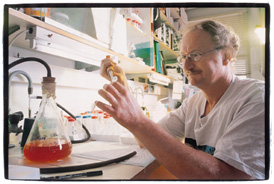For the proteins in our body there's not much room for mercy. If old or damaged proteins were allowed to accumulate in a cell, it would soon become useless. Thus, a sophisticated recycling system quickly breaks down deficient proteins. But, as has recently been found, healthy proteins, including proteins that inhibit cancer, often meet the same fate. This is due to a molecule that, together with its helpers, serves as a "death tag." Weizmann Institute scientists have identified one of the sinister helpers involved in the nefarious work of breaking down cancer-preventing proteins.
Twenty years ago, Profs. Abraham Hershko and Aharon Ciechanover of the Technion Medical School discovered an enzyme system dedicated to breaking down proteins in the cell. This system contains many kinds of enzymes, each responsible for seeking out and destroying a specific group of proteins, according to their three-dimensional structure. The scientists discovered the existence of a small protein called ubiquitin, which functions as a sort of "death tag." Ubiquitin is attached to the damaged protein by enzymes, and it then "calls out" to the various wrecking enzymes. After these complete their work, the "death tag" is released and returns to a cache in the cell.
It has recently come to light that the same system is also responsible for breaking down functioning proteins when their level rises above that desired in the cell. Prof. Moshe Oren of the Weizmann Institute's Molecular Cell Biology Department is studying the p53 protein, product of the p53 gene, whose proper functioning inhibits the development of tumors. Apparently over 50% of cancers in humans are caused by changes in the p53 gene that lead to the protein's dysfunction. In normal cells the amount of p53 protein is minute; but the moment the cell is exposed to a process that may lead to mutation and thence to the development of cancer, the amount and activity of the p53 protein increases rapidly. As a result, the cell ceases to divide until the damage is repaired. In those cases where the damage is impossible to repair, the p53 protein instructs the cells to self-destruct so that the organism as a whole may live. In either case the p53 protein prevents the malignancy from evolving.
In normal cells, where the risk of malignancy is nonexistent, the ubiquitin system is responsible for the rapid breakdown of the p53 protein, preventing its accumulation in amounts that could disrupt the cell's normal operation. When the cell is "spoiled" in a way that may cause it to become cancerous, p53 is called into action and accumulates rapidly. The key to its accumulation is a disguise designed to help it evade the ubiquitin system. "Today we know that exposing cells to DNA damage causes the addition of phosphate molecules to the p53 molecule," says Oren. "These changes prevent identification of the protein by the ubiquitin system, and 'rescue' it." Oren and his team have recently begun to focus on defining the biochemical processes that oversee each of the phosphate sites and finding the mechanism by which phosphate affects the ability of the ubiquitin system to recognize the p53 protein.
They have discovered that a second protein, called Mdm2, is responsible for attaching ubiquitin, the "death tag," to the p53 protein. Thus Mdm2 is a critical factor involved in regulating the levels of the p53 protein in the cell. "According to recent information, some of it acquired in our lab, it seems that the rate at which p53 is broken down may be altered not only by changes caused by phosphates, but also by variations in the concentration and activity of Mdm2 in the cell," says Oren.
p53 fulfills a major role in the processes that affect the accretion, or nonaccretion, of genetic mutations that may lead to the development of cancer. "The cells have developed complicated warning systems, each of which can delay the breakdown of p53, thus preventing cancerous processes," says Oren. "If we can understand how the breakdown of p53 is modulated, we can intervene in this process using medication and boost mechanisms that protect from cancer."
As a result of Oren's research, drugs that cause increased p53 activity in cancerous cells by interfering with its breakdown via Mdm2 are being developed by several drug companies, in an attempt to arrest proliferation and even induce tumor remission.

